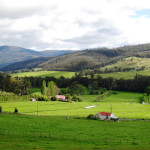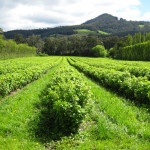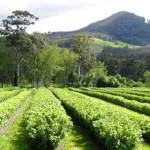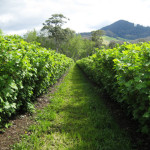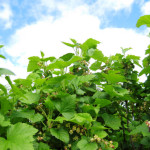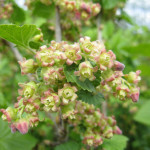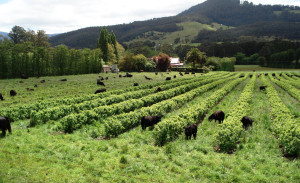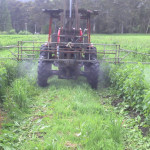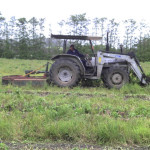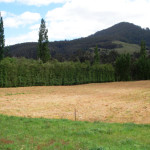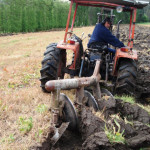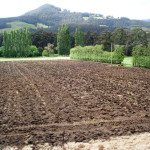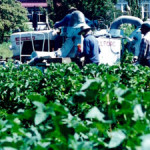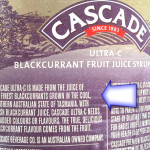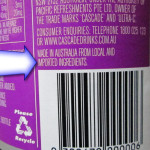Cascade, Coca Cola Amatil, and Blackcurrant Syrup – the death of a Tasmanian brand?
Nov 06
- View from the hill.
- Blackcurrants in springtime.
- Freshly mown rows
- In between the rows…
- …looking up…
- …at the flowers.
Wafting down memory lane.
Travellers to and from Glen Huon would’ve been struck with an unusual sight next to the road in the last couple of days; a sight that would usually mean alarm bells for us:
But it’s not alarming now. At least not for the reasons you’d expect, because we’ve actually been ploughing out blackcurrant bushes.
Some of them have been there for as long as my memory extends. Some of them I planted; that’s just one memory among many that came flooding back when I watched the bushes being turned over into the turf. Indeed, the amazing aroma of blackcurrant oil bursting through the tractor’s diesel fumes, vying with the occasional arrestingly offensive waft of sodden soil that had begun to turn anaerobic under the herbicide-deadened grass, took me off guard. I’d determined to take some photos for posterity, but I was surprised at the feelings it evoked.
- Herbicide
- Slashing off the bushes.
- Dead…
- …and buried.
- RIP
The smell of blackcurrant oil (prized as an essential oil), which is given off by the buds and leaves, is quite different to the smell of the fruit, but it’s a smell strongly associated with long days and long nights of torturously interrupted sleep, working to keep the crop watered (usually overnight) and to harvest the fruit. It triggers brief flashes of memory, which sometimes go back to childhood.
Early memories include walking outside to discover the blackcurrant patches buzzing with seemingly dozens of unknown people – pickers filling varied receptacles and having them weighed at bulk bins. Running along the headlands and looking down each row to see which was the most populated, and watching with interest to see the different approach different pickers took to the task at hand. And my intense shyness when approaching ‘the lady’ at the scales, with my Mum and my first ever bucket of “I picked it myself” fruit. I got to be reasonably good at the picking, apparently. My Mum says she promised me a generous dollar amount per 10kg bucket, and it got to the stage where she had to rethink her terms, I was picking so much.
Next were the first years of machine picking, where a contractor picked the fruit with his harvester. I was too young to be involved much with that, but I remember the spread my Mum put on for lunch; we’d sit out on the lawn in the shade of the palm tree on a summer’s day, with salads and lemon barley water. The sense of relief with which my Dad, two uncles, my older brother and the contractor and his son took their seats and tucked into their meals was one I picked up on early, and came to relate to later.
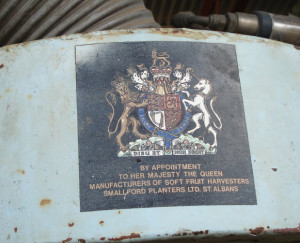
Bigger than a block of Pears soap, which I think was the only other thing I’d seen made by appointment to Her Majesty.
In 1983 my uncle bought his own harvester after a research trip in the UK. It took months to arrive by sea. It was a very exciting day when it came – the enormous sky-blue machine with a red cursive “Smallford” brand on each of its four matching trailers (that branding is now mostly battered and scraped beyond recognition). It was even marked with the “by appointment to Her Majesty the Queen” crest (the company had designed harvesters for Prince Charles’ crop. If my memory serves me correctly, the machine that was used to harvest his blackcurrants ended up in New Zealand).
Thinking about the weeks spent in the summer holidays on that machine brings back a real blur: a collage of faces of people employed during the harvest seasons over nearly 30 years; the day I noticed I was finally stronger than my superwoman Mum and could handle the 10kg buckets more easily than she (I reckon I could pinpoint the geographical location of the occurrence of that realisation to an accuracy of 10 metres); learning about every single nook and cranny in the machine where berries could hide overnight, seeping out their ascorbic acid-rich juices onto the framework – and spending an additional two hours each day with my uncle after the others had knocked off, washing it down and greasing it to prevent that rust from occurring; breakdowns (there always seemed to be one major one at least every two years) that often incurred even more after hours time, and getting bogged in the wetter rows; devising novel ways of keeping sane while doing a sometimes mind-numbing job (I wrote a short story almost entirely in my head one year); the early starts, late finishes, and numerous drink breaks each day; working through pelting rain to keep on schedule, hoping the rain stopped before it finally soaked through the ‘waterproofs’ that weren’t really; the many pranks we performed on each other; waking up at the end of one season and discovering with terror that I couldn’t quite get out of bed due to a ‘frozen’ back, apparently in protest against the labour of the preceding weeks; the joy of the occasional early knock off in February, and being able to jump into the Huon river for a half hour of respite, before heading back out to redirect some of that river onto the yet-to-be-harvested currants. And of course, the sense of pride seeing bottles of Cascade Ultra C blackcurrant juice on the supermarket shelves.
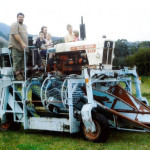
Another generation – me, my wife, our kids, my older brother and one of his sons, all on the old workhorse. Taken in 2007, after 24 years of hard labour for the harvester – not as shiny as it used to be, but still did a sterling job; we were complimented on the quality and presentation of the fruit.
In short, I can understand how forestry workers in a downturn can feel they’ve lost a lifestyle, and an identity, not just livelihood and an industry.
The post mortem
The Cascade fruit juice brand was acquired by Coca Cola Amatil (CCA) last year. We haven’t had a purchase order since. Last year’s crop (which wasn’t much to speak of, because it wasn’t well tended, because we hadn’t received any commitment to buy) dropped onto the ground, and this year we’re reducing our cropping area even more dramatically, because the berries are already forming, vital maintenance hasn’t been performed again, and all indications are that the fruit isn’t required for the Cascade brand this season either. The Tasmanian Blackcurrant Growers Association resolved to wind itself up this year; it was clearly becoming a white elephant.
We hope to get something a bit more ’boutique’ happening, which would justify retaining some of the well-established bushes (some of the bushes we’ve already removed were just about as old as me), but the days of large scale supply certainly appear to be long gone unless we can turn something up very quickly.
I personally wrote to CCA early this year ‘for the avoidance of doubt’, to paint a picture of the likely outcome if the situation as it then stood carried on in its then-present trajectory. I expressed the opinion that I expected they’d find themselves unable to buy Australian blackcurrants, period. After all, Australian blackcurrants are only grown commercially in Tasmania – the climate is unsuitable elsewhere. And Tasmanian blackcurrants are fast becoming scarce.
From my perspective, the end product was never marketed as well as it could’ve been. Not only is there that exclusivity of Tasmanian production (which has enjoyed growing regard in the ‘foodie’ scene in recent years), there are also the health benefits of the raw product. Blackcurrants are very rich in vitamin C, and studies in Scotland have positioned blackcurrants as the ‘old-faithful’ that beats all the new kids on the block – they’re more rich in antioxidants than goji berries, blueberries, pomegranates etc. Naturally if you process the hell out of the raw product, the health benefits aren’t going to be as marked (as GlaxoSmithKline found with its Ribena brand of blackcurrant juice), but there are clearly a few marketing angles that were never taken up well, even before CCA took over. Indeed, we repeatedly heard from family and friends interstate who reported not being able to source the Cascade product at all, and I held hope that with CCA behind the brand, the product would finally start to get some market penetration, capitalising on the Tasmanian angle.
But, apparently not. The new, less effusively Tasmanian label perhaps tells a tale:
- What the old label said.
- The new label. And the writing on the wall?

Blame game
I don’t blame CCA. This situation is a product of the transition the agricultural sector is going through. Agriculture seems to have always involved some decidedly Marxist elements – whether it was slaves working the fertile flood plains of the Nile for the Pharaoh, serfs creating wealth for their Manor lords, or Australia (or rather Australian landowners) riding on the sheep’s back (back-breakingly shorn by a shearer) in our grazing boom. I think what we’re seeing now is that ownership of the means of production has shifted, or rather that the boundaries of ‘production’ have become blurred; the big hurdles now are processing, marketing and distribution, and these are typically beyond the sphere enclosed by the farm gate. So the landowner – historically, and until only very recently, wielding a good deal of power – finds that this power has been eroded and it’s shifted to those controlling marketing and distribution.
For the most part this is an ‘untouchable’ situation for the farmer – at least for the traditional farmer who just wants to grow stuff. After all marketing, for example, need not have anything to do with the actual product the farmer is producing; indeed, that’s almost the role of marketing, and certainly of branding – to create a perception around the final product.
Distribution is not such a dark art but the logistics development that has been afforded by the increasing specialisation within society which, ironically, started with the specialisation of agriculture, has effectively created an enormous gulf between the points of production and sale; increasing specialisation has led to an ability to radiate the point of sale further and further away from the point of production. And because we’ve become more specialised, spanning that gulf has largely become the role of someone other than the producer.
Processing is another hurdle which, especially for a crop like blackcurrants, can be a big one. While the flavour of blackcurrant cordial appeals to most people, the raw product enjoys a narrower appeal. My kids will walk through the bushes and pick and eat the berries straight off the bush with relish, but they have what I’d class as slightly unusual taste (my 11 year old son also enjoys a curry and sucks lemons…) Others enjoy the raw fruit with a serve of icecream, and others still rave about the raw fruit on its own. But on the whole, it’s the processed (and sugared) product that most people are familiar with. So, short of having the kind of (very, very expensive) machinery (and accompanying food hygiene infrastructure) that can press a truckload of fruit in one hit, commercial quantities of fruit create their own logistical problems with storage and so forth.
I think the days are becoming numbered for those farming families who just want to be producers. Just as the days of working for one employer, for a lifetime, have become pretty much unthinkable for people entering the workforce now, the same is true for producers; we may be on a good wicket for a while, but if that’s all we do we’re exposing ourselves to enormous risk. ‘Single point sensitive’ is the term we used to use in my project management days; if this one thing changes, the whole thing comes crashing down.
Add to that the rising costs of labour (last year Australia’s median wealth was the highest of any country), and the farmer’s lot is not such a good one anymore. But there’s no justice to be gained by whinging about lost supremacy in an already inequitable system.
Which is why you have to tip your hat to producers like Willie Smith’s for both creating their own product, controlling their own marketing, and dovetailing with existing systems of processing and distribution. Or a producer like Eatem Organic Farm which has largely managed to bypass, old-style, the need for a distribution network (by trucking its goods to market each week) and IS its own brand; a ‘what you see is what you get’ approach. It must be bloody hard work after a week of farming to then embark upon an insanely early start to a Saturday, but it’s cutting out its own niche, and building a reputation which it could leverage later if it wants to take the expansion route.
So, no, I don’t “blame” CCA for our position. But ultimately CCA will, like us, reap what it’s sown; from my point of view they’ve put the Cascade Ultra C brand on a fast track to death. Which, relative to their Coke bread and butter, is probably going make no difference at all to them.
But, like most things these days it will come down to consumer choice, and it’s quite likely that CCA knows the market better than me; perhaps not too many people will care whether their blackcurrant juice comes from Tasmania or Poland.
If you do, check the label. There’s a Juicy Isle (also Tasmanian-owned) blackcurrant juice which is apparently using Tasmanian fruit. For now, anyway.
*Update 6/1/2014. People keep telling me that they’ve heard that CCA has committed to buy from Tasmanian growers – and I see Coca Cola Australia is making the ‘from Tasmania’ assurance on its facebook page. My understanding is that CCA always recognised the importance of having Tasmanian fruit in a Tasmanian brand, but the problem for us is that we can’t just spend thousands of dollars maintaining a crop for which we have no purchase order. An in-principle agreement is lovely, but it doesn’t pay the bills. I note too (as per my more recent post) that there has been yet another label change and, at the last time I checked, the reference to imported ingredients had been removed, and Tasmanian fruit was again promoted on the label. But again, that’s not much comfort as we plough out the bushes.
*Update/Edit 12/1/2014. My bad – with my fixation on securing new contracts, I’ve neglected to mention that CCA did honour any contracts that existed at the time of the takeover – so fruit may have been sold to CCA under old contracts. Ours certainly wasn’t renewed. I can’t speak for other growers, but the fact that the Tasmanian Blackcurrant Growers Association resolved to wind itself up, probably gives a fair indication of the level of confidence in ongoing business with CCA. I’d be happy to learn that CCA has actually committed to buy an amount fruit at a certain price, rather than just saying they value Tasmanian fruit.
*Update 31/1/2014. The Tasmanian Country published my letter to the editor in response to a story with the headline “a berry good outcome” the week before, which announced that CCA had finally ordered currants from a Westerway farm. They edited my letter a bit. Here’s what I wrote:
Congratulations to the Clark family at Westerway on securing a market for their blackcurrants (Tasmanian Country, January 24) – a well-deserved result after many months of work.
Unfortunately I can’t muster the same sentiment for the reporting itself, in a publication that seeks to be a defender of our farms. Had McCain or Simplot overseen the takeover of a Tasmanian industry, with subsequent non-purchase of crops and/or wholesale reduction of cropping areas in at least two thirds of that industry’s Tasmanian farms – as has happened under Coca Cola Amatil’s takeover of the Cascade Ultra C brand – I would not expect to see a headline suggesting “a very good outcome”. Our farm alone – which has supplied blackcurrants to Cascade since the 1970s, with peak ton-per-acre yields unmatched anywhere else in Australia – is now down to around 30% of the cropping area of peak years, with what remains earmarked to go as a result of not having a large scale buyer for two successive years.

